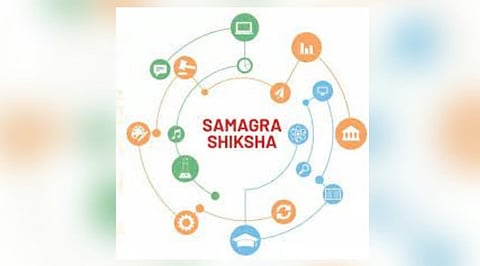

CHENNAI: The Tamil Nadu government is likely to drag the union government to the Supreme Court soon to get the Rs 2,152 crore due under the Samagra Shiksha (SS) scheme from the centre.
The state’s inclination to move the SC has been strengthened by last month’s report of the Parliamentary Standing Committee on Education headed by Congress leader Digvijaya Singh. Sources in the school education department said the legal opinion received by the state from experts in this regard has been favourable.
The move to approach the SC to get the SS funds comes as the centre has been obdurate in denying the funds despite political pressure from the ruling DMK, its allies, and almost all other parties in the state, including the AIADMK, PMK, NTK, and TVK.
The BJP-led government is firm that the centre’s share of funds for the scheme will be released only if Tamil Nadu signs the memorandum of understanding (MoU) for another centrally-sponsored scheme, PM SHRI. The MoU also includes consent to fully implement the National Education Policy (NEP 2020) along with the three-language policy that the state government is steadfastly opposed to.
In its recent budget for 2025-26, the Tamil Nadu government said it would compensate for the funds withheld by the centre from its own kitty rather than signing the MoU.
Though the tussle has been going on for more than a year, a senior minister told TNIE that the state government did not want to rush to the court without exhausting all the other options as the union government may use the case in the Supreme Court as a ruse to further delay the release of funds.
‘Tying SS fund release to PM SHRI MoU unconstitutional’
The parliamentary panel urged immediate release of SS funds to TN, Kerala, and WB to prevent disruption in salaries, teachers training programmes, and school infrastructure maintenance. The panel said that withholding SS funds to states for not entering into an MoU for “separate schemes like PM SHRI” is “not justifiable”.
The report noted that SS (which is in force since 2018 with origins dating back to the Sarva Shiksha Abhiyan launched in 2001) predated PM SHRI, which was introduced in 2022 to create exemplar schools to showcase NEP. It said SS is intended to help states achieve the targets set under the Right of Children to Free and Compulsory Education (RTE) Act, which is a law passed by Parliament. The report said that RTE Act cannot be superseded by NEP which is an “executive policy statement”.
Linking SS with NEP, and by extension the PM SHRI scheme, was initiated when the Union Cabinet approved the continuation of SS from April 1, 2021 to March 31, 2026. While granting approval, the centre said the “scheme not only provides support for the implementation of the RTE Act but has been aligned with the recommendations of NEP 2020.
Consequently, in October 2022, a month after the launch of PM SHRI, the Ministry of Education released a “Framework of Implementation” for SS, integrating NEP with it. Though the scheme PM SHRI is never mentioned in the framework, the linking of NEP 2020 with SS seems to be the reasoning for making the release of SS funds conditional to the signing of MoU for PM SHRI.
Chennai South MP from DMK Thamizhachi Thangapandian, who is part of the parliamentary committee, said “Tying SS fund release to NEP and PM SHRI MoUs constitutes unconstitutional executive overreach.” She said the committee viewed such conditionalities as violative of both the RTE Act and the principles of cooperative federalism. She said the committee flagged concerns about the SS framework of 2022 as it marked a shift from a rights-based education to outcome-based policy targets aligned with the NEP 2020. It also introduced procedural hurdles and deviated from the scheme’s foundational link to the RTE Act.
Saying that the Union Ministry of Education did not respond to the committee’s concerns, the MP said the government must treat the committee’s findings not as mere advice but as democratic accountability in action.